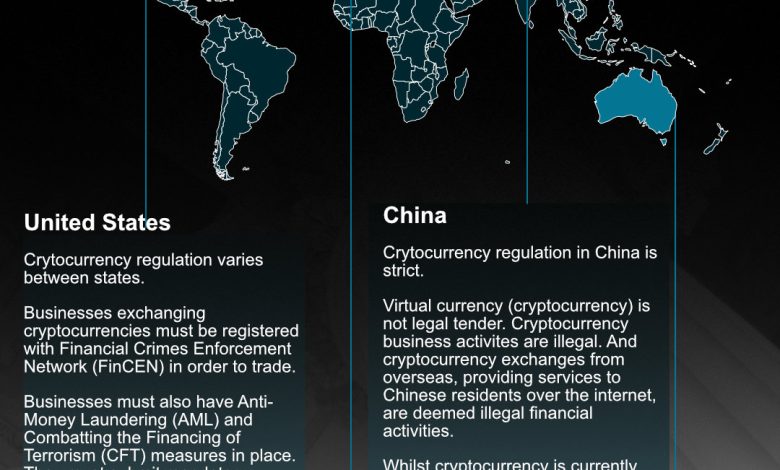The Current State of Crypto Regulations Worldwide

- Introduction to Crypto Regulations
- Key Players in Crypto Regulation
- Challenges Faced by Regulators
- Impact of Regulations on Crypto Market
- Comparison of Regulations in Different Countries
- Future Outlook for Crypto Regulations
Introduction to Crypto Regulations
When it comes to the world of cryptocurrencies, regulations play a crucial role in shaping the landscape. Governments around the globe have been grappling with how to regulate this new form of digital currency, with varying degrees of success. The regulatory environment for cryptocurrencies is still in its infancy, with many countries struggling to keep up with the rapid pace of innovation in the space.
Some countries have embraced cryptocurrencies with open arms, seeing them as a potential boon to their economies. Others have taken a more cautious approach, wary of the potential risks that cryptocurrencies pose. The regulatory framework for cryptocurrencies varies widely from country to country, with some nations taking a hands-off approach, while others have implemented strict regulations to govern the use of digital currencies.
One of the biggest challenges facing regulators is how to strike a balance between fostering innovation in the cryptocurrency space and protecting consumers from fraud and abuse. As cryptocurrencies become more mainstream, regulators are under increasing pressure to come up with comprehensive frameworks that address the unique challenges posed by digital currencies.
Key Players in Crypto Regulation
When it comes to **crypto regulation**, there are several **key players** around the world who are shaping the landscape of the industry. These **regulatory bodies** play a crucial role in establishing guidelines and rules for **cryptocurrency** activities within their respective jurisdictions. Here are some of the **major players** in **crypto regulation**:
- The **Securities and Exchange Commission (SEC)** in the United States is one of the most influential **regulatory agencies** when it comes to **cryptocurrency**. The SEC is responsible for enforcing **securities laws** and regulations, which can have a significant impact on **crypto** projects and **investors**.
- The **Financial Conduct Authority (FCA)** in the United Kingdom is another **key player** in **crypto regulation**. The FCA oversees **financial markets** and **services**, including **cryptocurrency exchanges** and **wallet providers**.
- In **Asia**, the **Financial Services Agency (FSA)** in Japan has been actively involved in **regulating** the **crypto** industry. Japan was one of the first countries to **recognize** **Bitcoin** as a **legal form** of payment, and the FSA has implemented **regulations** to protect **consumers** and prevent **money laundering**.
- **European Union** has also been working on **regulatory frameworks** for **cryptocurrencies**. The **European Securities and Markets Authority (ESMA)** has been monitoring **crypto** activities and providing **guidance** to **member states**.
- **International organizations** such as the **Financial Action Task Force (FATF)** have also been involved in **setting standards** for **crypto regulation** on a global scale. The FATF has issued **guidelines** for **virtual asset service providers** to prevent **illicit activities**.
Overall, these **key players** in **crypto regulation** are working towards creating a **safe and transparent** environment for **cryptocurrency** **users** and **investors**. By **establishing** clear **rules** and **guidelines**, they aim to **promote** **innovation** while **protecting** **consumers** and **safeguarding** **financial stability**.
Challenges Faced by Regulators
Regulators around the world are facing numerous challenges when it comes to regulating the rapidly evolving cryptocurrency market. One of the main challenges is the lack of uniformity in regulations across different countries, leading to inconsistencies in how cryptocurrencies are treated. This lack of harmonization can make it difficult for regulators to effectively oversee the industry and protect investors.
Another challenge faced by regulators is the decentralized nature of cryptocurrencies, which makes it challenging to track transactions and identify individuals involved in illicit activities. This anonymity can be exploited by criminals for money laundering, terrorist financing, and other illegal activities, posing a significant risk to the financial system.
Additionally, the fast-paced innovation in the cryptocurrency space presents a challenge for regulators who struggle to keep up with new technologies and products. This can result in outdated regulations that are unable to address emerging risks effectively. Regulators must find a balance between fostering innovation and protecting consumers and investors from potential harm.
Moreover, the global nature of the cryptocurrency market means that regulations in one jurisdiction can have spillover effects on other countries. Regulators must coordinate and collaborate with their international counterparts to address cross-border issues and ensure a cohesive regulatory framework.
In conclusion, regulators face a complex and dynamic environment when it comes to regulating cryptocurrencies. They must navigate through various challenges such as regulatory inconsistencies, decentralized nature, technological innovation, and international coordination to effectively oversee the market and protect the integrity of the financial system.
Impact of Regulations on Crypto Market
The impact of regulations on the crypto market is a topic of significant interest and concern for investors and enthusiasts alike. Regulations play a crucial role in shaping the landscape of the crypto industry, influencing everything from market volatility to investor confidence.
**One** of the key ways in which regulations impact the crypto market is through their effect on market stability. When regulations are unclear or inconsistent, it can lead to uncertainty among investors, causing prices to fluctuate wildly. On the other hand, clear and consistent regulations can help provide a sense of stability and predictability, which can attract more investors to the market.
**Another** important aspect of regulations is their impact on investor protection. Regulations that are designed to protect investors from fraud and scams can help build trust in the market, leading to increased participation and investment. However, overly restrictive regulations can also stifle innovation and growth in the industry, so finding the right balance is crucial.
**Moreover**, regulations can also influence the adoption of cryptocurrencies on a global scale. Countries with favorable regulations are more likely to attract businesses and investors looking to operate in a crypto-friendly environment. On the other hand, countries with strict regulations may drive businesses away, leading to a fragmented market with varying levels of adoption.
**In conclusion**, the impact of regulations on the crypto market is a complex and multifaceted issue. While regulations can help provide stability and protect investors, they can also hinder innovation and growth if not implemented thoughtfully. Finding the right balance between regulation and innovation is key to ensuring the long-term success and sustainability of the crypto market worldwide.
Comparison of Regulations in Different Countries
When it comes to the regulations surrounding cryptocurrency, different countries have taken varying approaches. Some nations have embraced digital assets and have implemented regulatory frameworks to support their growth, while others have taken a more cautious stance.
In the United States, for example, the regulatory environment for cryptocurrencies is complex and fragmented. Different government agencies have different interpretations of how digital currencies should be regulated, leading to uncertainty in the industry.
On the other hand, countries like Japan and Switzerland have taken a more proactive approach to crypto regulations. They have implemented clear guidelines for cryptocurrency exchanges and have created a supportive legal framework for digital assets to thrive.
Meanwhile, countries like China and India have taken a more restrictive approach to cryptocurrencies. They have either banned crypto trading altogether or have imposed strict regulations on digital asset transactions.
Overall, the regulatory landscape for cryptocurrencies varies greatly from country to country. While some nations are embracing digital assets and creating supportive regulatory frameworks, others are taking a more cautious or restrictive approach.
Future Outlook for Crypto Regulations
The future outlook for **crypto regulations** remains uncertain as governments around the world grapple with how to approach this rapidly evolving industry. While some countries have taken a proactive approach to regulating cryptocurrencies, others have been more cautious, citing concerns about the potential risks associated with digital assets.
In the coming years, it is likely that we will see a **shift** towards more comprehensive and consistent regulations for cryptocurrencies. This could involve greater oversight from regulatory bodies, as well as new laws aimed at protecting consumers and investors. Additionally, there may be increased collaboration between governments and industry stakeholders to develop **best practices** for the **crypto** market.
One of the key challenges facing regulators is how to strike a balance between fostering **innovation** in the **crypto** space and mitigating the risks of fraud and money laundering. Finding this balance will be crucial to ensuring the long-term **sustainability** of the **crypto** industry and maintaining **public trust** in digital assets.
Overall, the future of **crypto regulations** is likely to be shaped by ongoing **developments** in technology, finance, and geopolitics. As the **crypto** market continues to grow and evolve, regulators will need to adapt their **approach** to keep pace with these changes. By working together, governments and industry stakeholders can help create a **regulatory** environment that supports **innovation** while protecting consumers and investors.



